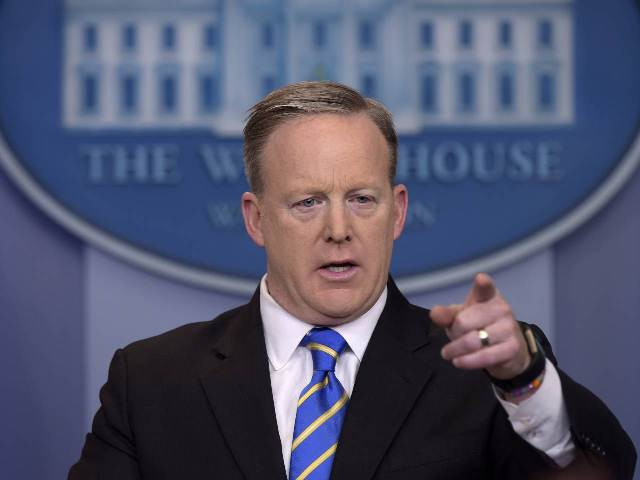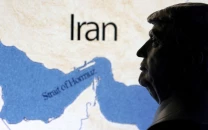Trump administration open to more strikes on Syria: White House
The sight of people being gassed and blown away by barrel bombs ensures, spokesman Sean Spicer

White House spokesperson Sean Spicer. PHOTO: FILE
"The sight of people being gassed and blown away by barrel bombs ensures that if we see this kind of action again, we hold open the possibility of future action," White House spokesman Sean Spicer told reporters.
"If you gas a baby, if you put a barrel bomb in to innocent people ... you will see a response from this president."
Barrel bombs are oil drums or cylinders packed with explosives and shrapnel. Trump ordered a cruise missile strike on Syria's Shayrat air base last week in response to what his administration and US allies say was a poison gas attack by Syria's military in which scores of civilians, including many children, died.
Trump says 'what Assad did is terrible,' 'something should happen'
Spicer said later his mention of barrel bombs as a potential trigger for further action by the United States did not reflect a change in position.
"Nothing has changed in our posture," he said by email. "The president retains the option to act in Syria against the Assad regime whenever it is in the national interest, as was determined following that government's use of chemical weapons against its own citizens. And as the president has repeatedly made clear, he will not be telegraphing his military responses."
Strike hits 20% of Syria's operational aircraft
The US cruise missile strike on a Syrian air base last week damaged or destroyed 20 per cent of Syria's operational aircraft, as well as fuel and ammunition sites and air defense capabilities, Defense Secretary Jim Mattis said on Monday.
"The Syrian government has lost the ability to refuel or re-arm aircraft at Shayrat airfield and at this point, use of the runway is of idle military interest," Mattis said in a statement. "The Syrian government would be ill-advised ever again to use chemical weapons."
Pentagon suspects chemical weapons still at air base
The Pentagon believes the Syrian regime likely has additional chemical weapons stocks at the airfield struck by US missiles last week, but these were deliberately left untouched, an official said on Monday.
US intelligence experts assess Syrian President Bashar al-Assad's military is probably hoarding the weapons in munitions depots at Shayrat airfield near Homs in central Syria, the US military's Central Command spokesman Colonel John Thomas said.
"We suspected there was a significant probability there could be other chemical weapons which would be ready to go, weaponized in those facilities, and so we didn't strike those," Thomas told reporters.
The chemical stocks were left untouched because the Pentagon did not want to risk unintentionally sending a plume of toxic gas across parts of Syria.
"Our advice was to make sure we didn't inflict any greater damage by touching any of the chemical weapons in the area," Thomas added.
Russia warns of serious consequences from US strike in Syria
"We were trying to degrade their capability to launch aircraft and to load them up with chemical weapons."
The Pentagon says the strike destroyed more than 20 Syrian jets but the military has come under criticism for not targeting Shayrat's runways, amid reports regime planes were again using the base hours after the attack by 59 Tomahawk cruise missiles.
Thomas said the runways were deliberately avoided because the United States was trying to draw a clear line that its military action was in response to the suspected chemical attack, and not signal a willingness to get more involved in Syria's brutal civil war.
US forces gave Moscow a heads up shortly before Friday's strike, as Russian personnel and equipment were based at Shayrat under Russia's ongoing military intervention to prop up Assad.
US strikes on Syria: How the world reacted
Moscow reacted furiously to the US strike and immediately threatened to suspend a vital hotline established to avoid mishaps between the two powers in Syria.
Thomas refused to confirm whether the so-called "deconfliction line" remains operational, but said that even without it, "there are still ways for the pilots to hail each other."
While US and Russian pilots can use radar to see each other, the lack of a direct line of communication would further heighten the risks of misunderstandings or accidents in Syria's already crowded skies.



















COMMENTS
Comments are moderated and generally will be posted if they are on-topic and not abusive.
For more information, please see our Comments FAQ